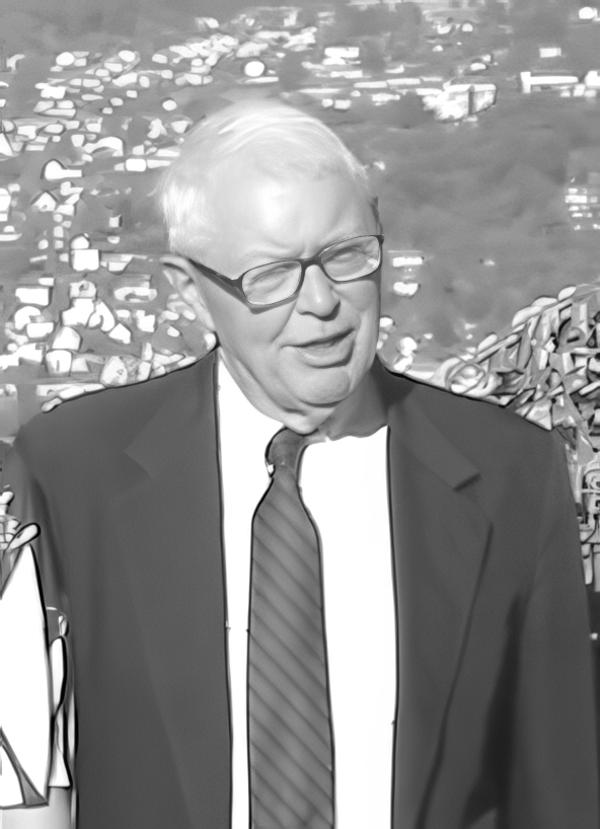Necrology
Because Hamilton Remembers


Gordon Earle Insley '52
Jul. 5, 1930-Jul. 4, 2024
Gordon Earle Insley ’52, P’86 died on July 4, 2024, in Thalwil, Switzerland. Born in Dayton, Ohio, on Sept. 5, 1930, he moved between Litchfield, Conn., Newport Beach, Calif., and Detroit, because his father was periodically transferred by Ford Motor Co. as a result of his work designing aircraft engines. Gordon came to Hamilton from the Howe Military School, then in Indiana.
On the Hill, he was a member of the Emerson Literary Society, serving as its president in his senior year, and majored in history and English. He was both on The Hamiltonian staff and the track and cross-country teams in both his freshman and sophomore years. He joined the Debate Club as a junior and senior, when he was also a member of the International Relations Club.
Following the first semester of his junior year, Gordon left the College for military service in the U.S. Army and served in Korea. Honorably discharged with the rank of lieutenant in 1953, he had by then commanded a “mixed” unit of American and South Korean troops and been awarded both a Purple Heart and a Bronze Star. He returned to campus in February 1954 to complete his degree. He graduated with the Class of 1955 but retained his allegiance to his entering class.
From Hamilton, and with the aid of a scholarship from the College, Gordon proceeded to the University of Chicago Law School to pursue both a Juris Doctor and a master’s degree in foreign law. Earning his J.D. in 1957, he then pursued a master’s degree in comparative law.
The curriculum of the master’s program began with intensive training in the law and legal institutions of either France or Germany, supplemented by specialized study of international, public, and commercial law. In the second year, students elected to study at a university in one of four European countries, combined with work in a law office or other legal employment. Gordon chose Switzerland and, with the support of a scholarship, he studied Swiss law for two semesters at the University of Bern, receiving his master’s degree in comparative law in 1959.
It was while in Bern that he met Brigitta Steffen, who was also studying law at the university. As their relationship developed, she taught him to ski and, with her siblings, took Gordon on a variety of challenging experiences to determine if he was adventurous enough for her. He proved to be.
Gordon returned to Chicago in the fall of 1959 to begin work in corporate and securities law in the firm of Bell, Boyd, Lloyd, Haddad & Burns, including some international estate and tax work. In December 1960, he returned to Switzerland and, for the next two-and-a-half years, provided counsel regarding American-Swiss tax and corporation law for a firm headquartered in Zurich. On Feb. 1, 1961, he and Brigitta were married in Thun, Switzerland, her hometown. They had four children. Sadly, their eldest, Pierre, died in infancy.
In July 1962, he was hired as a tax and corporate attorney in the legal department of a multinational corporation: Allgemeine Treuhand A.G., based in the Swiss city of Vevey. His responsibilities called upon his knowledge of SEC requirements imposed on foreign companies owning more than 10% of a New York Stock Exchange-traded company, on his ability to help prepare an initial public offering in Ceylon (now Sri Lanka), as well as to assist in the formation of a joint venture with the government of Nigeria.
For 15 months, beginning in October 1966, he was a U.S. specialist attorney in the Zurich office of Baker & McKenzie, a Chicago-based law firm specializing in international law and advising U.S. companies on their Swiss and, to a lesser extent, other European operations. At the beginning of 1968, Gordon joined the Geneva branch of the merchant bank Hill, Samuel & Co. to handle mergers, joint ventures, and investment and security work.
Having worked for four different firms and gaining useful experience in dealing with a range of legal challenges, as well as acquiring a favorable professional reputation, Gordon was recruited by Citibank in 1969, initially to work in its Geneva office. As events would prove, Citibank was where the balance of his career unfolded. In 1971, he was transferred to New York City to become the assistant general counsel for the entire bank.
In that capacity, Gordon was called upon to resolve various significant legal problems the bank confronted. In one noteworthy instance, Citibank had to deal with the fallout of the collapse of Banco Ambrosiano, the principal shareholder of which was the Vatican Bank. Banco Ambrosiano was implicated in several shady enterprises, including funding illegal arms purchases and dealings with the Mafia, in which funds were laundered through Citibank accounts. Gordon had to testify in court cases in both London and Zurich in defense of his employer.
He returned to Zurich in 1985, now as general counsel for the Citicorp Investment Bank: he retained the position until his retirement in 1994. As before, on one occasion Gordon had to resolve a headline-producing problem. In this instance, it was created by the Reagan administration, when some of the funds received from selling arms to Iran wound up in Citibank accounts, from which they were forwarded to a right-wing militia, the Nicaraguan Contras. For this case, he had to testify before Congress on behalf of Citibank.
At first, Gordon’s retirement looked a lot like his work life. He became an external consultant to the Citicorp Investment Bank and mentored his successor as general counsel. As time passed, he and Brigitta were able to devote more time to traveling. The destinations they chose were either of historical significance or centers of cultural activities, related both to the visual arts and to music, and which included interesting architectural sites.
Gordon was a dog lover and an amateur photographer as well as an avid reader, primarily of historical and classical subjects. He enjoyed classical music, which no doubt included performances by Brigitta, who was an organist for many years. In later years, he was drawn to information technology, teaching himself how to use the LINUX operating system.
For a man of such diverse interests, it is not surprising that Hamilton played an important formative role in his life. In his 50th reunion yearbook, Gordon wrote: “the richness of Hamilton College’s offerings in learning, and my failure to concentrate on these treasures then, realized only much later, left me with a desire to benefit from all learning opportunities.” In that reflection, Gordon no doubt spoke for many alumni who, only in retrospect, realized how much they missed while on the Hill.
Gordon E. Insley was predeceased by his father, Robert Insley, Class of 1916, P’52, GP’86, his uncle Herbert Insley, Class of 1914, a cousin, Robert Insley ’45, and his infant son, Pierre. He is survived by his wife, his son Robert G. Insley ’86, two daughters, and three grandchildren.
Note: Memorial biographies published prior to 2004 will not appear on this list.
Necrology Writer and Contact:
Christopher Wilkinson '68
Email: Chris.Wilkinson@mail.wvu.edu

The Joel Bristol Associates
Hamilton has a long-standing history of benefiting from estate and life payment gifts. Thoughtful alumni, parents, and friends who remember Hamilton in their estate plans, including retirement plan beneficiary designations, or complete planned gifts are recognized and honored as Joel Bristol Associates.
Contact
Office / Department Name
Alumni & Parent Relations
Contact Name
Jacke Jones
Director, Alumni & Parent Relations
